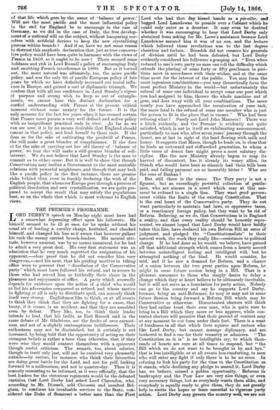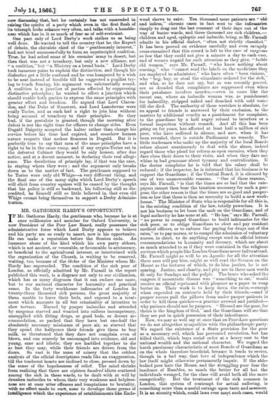THE PREMIER'S PROGRAMME:
LORD DERBY'S speech on Monday night must have had a, somewhat depressing effect upon his followers. He himself seemed to be ill at ease, for he spoke without his usual air of leading a cavalry charge, hesitated, and checked himself, and changed his line asif aware that however giallant his rush the enemy carried breech-loaders. His mental atti- tude, however unusual, was by no means unnatural, for he had to admit a very great deal. His very first statement was an admission that he very much regretted the resignation of his opponent,—clear proof that he did not consider him very dangerous,—and his next, that his guiding motives in taking office were to prevent that "dissolution of the Conservative party" which must have followed his refusal, and to secure to those who had served him so faithfully their share in the pleasures and enjoyments of office. A party which avowedly depends for existence upon the action of a chief who would as lief his adversaries conquered as retired, and whose motive in fighting at all is only to distribute spoil, can scarcely think itself very strong. Englishmen like to think, or at all events to think they think that they are fighting for a cause, that booty, if it comes, is an accident, and that they are ennobled even by defeat. They like, too, to think their leader intends to lead, that his faults, as Earl Russell said in the same debate of Mr. Gladstone, are the faults of over earnest- ness, and not of a slightly contemptuous indifference. Their enthusiasm may not be diminished, but it certainly is not increased, by being told that the opportunity of acting on their strongest beliefs is rather a bore than otherwise, that if they were wise they would content themselves with a quiescent though useful criticism. The remark, too, about salaries, though in itself only just, will not be received very pleasantly outside.-by rectors, for instance, who think their favourites are doing great battle for the Lord, and not for pelf, looking forward to a millennium, and not to quarter-day. Then it is scarcely roes:muting to be informed, as it were officially, that the beat leaders for the vietorious regiments would be the defeated captains, that Lord Derby had asked Lord Clarendon, who, according to M. Disraeli, sold Oircassia and insulted Bel- gium, to coatinue his invaluable services to the State, con- sidered the Duke of Somerset a better man than the First Lord who had that day, kissed hands as a pie-oiler, begged Lord Lansdowne to preside over a Cabinet which he could only enter as a deserter. It may even be doubted whether it was encouraging to hear that Lord Derby only- abstained from asking for Mr. Lowe's assistance because Lord
Lansdowne assured hen it was of no use, and the lecture which followed these revelations was to the last degree- cheerless and forlorn. Benedek did not censure his generals.
• of division until he had been defeated, but Lord Derby' evidently considered his followers a grasping set. "Even wham reduced to one's own party no man can tell the difficulty which attends the placing of some forty or fifty gentlemen in posi-- tions most in accordance with their wishes, and at the same time most for the interest of the public. You may form the most ingenious combinations—you may theoretically form the most perfect Ministry in the world—but unfortunately the refusal of some one individual to accept some one post which you had assigned to him, throws the whole machine out of gear, and does away with all your combinations. The more- nearly you have approached the termination of your task, the more fatal is the refusal of some one member who is just the person to fit in the place that is vacant." Who had been refusing what ? Surely not Lord John Manners! There was a hitch evidently, and the Premier is evidently not quite- satisfied, which is not in itself an exhilarating announcement, particularly to men who, after seven years' journey through the- desert, are at last in sight of the land flowing with milk and honey. It suggests that Moses, though he leads on, is clear that he leads an untoward and stiffnecked generation, to whom a little more of desert fare might prove a most salutary dis- cipline. Has the new Ministry already begun to reap its harvest of discontent, has it already its weary allies, its. friends who would have been so staunch had their bills been paid, and failing payment are so incurably bitter ? Who are- the sons of Dathan ? • But still there is the cause. The Tory party is not a figment, but an exceedingly powerful collection of gentle- men, who are sincere in a creed which may at this mo- ment be reduced to a single line. They want Rend govern- ment within the limits of the existing Constitution. That is the real heart of the Conservative party. They do not
want particularly to maintain bad laws, or oppressive taxes, or a reactionary foreign policy, but they want to be rid. of"
Reform, Believing, as we do, that Conservatism is in England a reality, and that every reality should be honestly repre- sented, we almost hoped that Lord Derby would have boldly taken this line, have declared his own Reform Bill an error of judgment, and pledged the "Constitutionalists" to their natural work, the work they really fire—resistance to political change. If he had done so he would, we believe, have gained all that additional strength which comes from a hearty accord between unintelligent feeling and intelligent will, but he' attempted nothing of the kind. He would consider, he- said, and if he saw a demand for Reform, and a chance of a union between the two great parties upon Reform, he might in some future session bring in a Bill. That is a pleasant assurance to those who simply desire to delay a change which they at heart believe to be ultimately inevitable, but it will not serve as a foundation for party action. Nobody can go to the country and say he supports Lord Derby, because, being an anti-Reformer, he may or may not in some- future Session bring forward a Reform Bill which may be- Conservative or otherwise. Discontented *electors will think they had rather trust their own man, who is quite sure to' bring in a Bill which they more or less approve, while con- tented electors will perceive that their ground of content may at any moment be cut from under their feet. There is a want of frankness in all that which frets squires and rectors who. like Lord Derby, but cannot manage diplomacy, and are-
bothered to find a cue for their tenantry or admirers. "The- Constitution as it is" is an intelligible cry, to which thou- sands of hearts are sure at all times to respond, but "the Bill which we do not want to be brought in by and bye," that is less intelligible, or at all events less comforting, to men who will enter any fight if only there is to be no cross. In refusing to link his party for the time to the Constitution as it stands, while declining any pledge to amend it, Lord Derby has, we believe, missed a golden opportunity. Reforms in bankruptcy and the Poor Law are very nice things, or even very necessary things, but as everybody wants them alike, and everybody is equally ready to give them, they do not greatly help to excite the hopes or fears essential to vigorous party action. Lord Derby may govern the country well, we are not
now diacuaskg that, but he certainly has not succeeded in raising the spirits of a party which even, in the. first flush of its triumph looks askance very often, and. talks with a humble- ness whirl has in it as much of fear as of self-restraint.
One part only of Lord Derby's work strikes us as being well done. He wanted to tell the country that he, the Rupert of debate, the chivalric chief of the "gentlemanly interest," hadnot tried unsuccessfully to form an unprincipled coalition. True, he had asked some of his enemies' army to desert, but then that was not a treachery, but only a new alliance, not "a coalition," but "a Ministry on a broad basis." Lord Derby took immense pains to explain the distinction, and though his dialectics got a little confused and he was hampered by a wish to be neat instead of forcible till he suggested a pugilist try- ing to teach fencing, his argument was substantially sound. A coalition is a junction of parties effected by suppressing distinctive principles ; he wanted to effect a junction which should enable both parties to express the same principles with greater effect and freedom. He argued that Lord Claren- don; and the Duke of Somerset, and Lord Lansdowne were really. Tories, and as such had a right to join. him without being accused of treachery to their principles. So they had, if the postulate is granted, though the morning after defeat is not the right time for officers to change sides. Even Dugald Dalgetty accepted the halter rather than change his service before his time had expired, and somehow human nature respects that useless firmness in Dugald. But it is perfectly true to say that men of the same principles have a right to be in the same camp, and if any crypto-Tories sat in the defeated Cabinet they would be only honest, after due notice, and at a decent moment, in declaring their real allegi- ance. The dereliction of principle lay, if that was the case, in staying where they were ; and the argument only breaks down as to the matter of fact. The gentlemen supposed to be Tories were only old Whigs—& very different thing, and the final one of the many sighs which Lord Derby's speech will elicit from country squires will be caused by the thought that his policy is still so backward, his following still so dis- credited, he himself still so little believe& in, that even old Whigs cannot bring themselves to support a,Derby Adminis- tration.































 Previous page
Previous page